Eating a plant-based diet can be extremely healthy, but it is important to ensure that you are getting all of your daily nutrients.
Vitamin D is an essential nutrient for keeping bones and teeth strong and healthy – fortunately, plenty of vegan sources of Vitamin D are available!
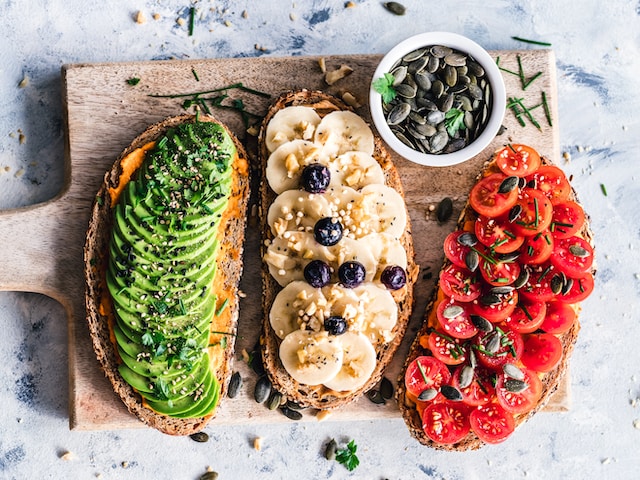
In this article, we’ll provide a comprehensive list of vegan sources of vitamin D so you can ensure you’re getting enough in your diet.
Vitamin D plays an incredibly important role in our bodies; it helps us absorb calcium from food, keeps our immune system functioning normally, and protects against conditions like osteoporosis and cancer.
For those following a vegan lifestyle or looking to increase their intake of plant-based foods, understanding which foods contain vitamin D is vital to have the healthiest possible diet.
Keep reading to discover the top vegan sources of this vital nutrient!
Overview Of Vitamin D And Veganism
Vitamin D is an essential vitamin that helps our bodies absorb calcium, build strong bones, and regulate the immune system. It’s found naturally in some animal-based foods like fish and eggs, but it can also be synthesized from sunlight exposure on the skin.
Vegans are people who abstain from consuming any animal product or byproduct for ethical reasons. For those following a plant-based lifestyle, getting enough Vitamin D can be challenging without supplementing their diet with fortified vegan food sources or taking supplements.
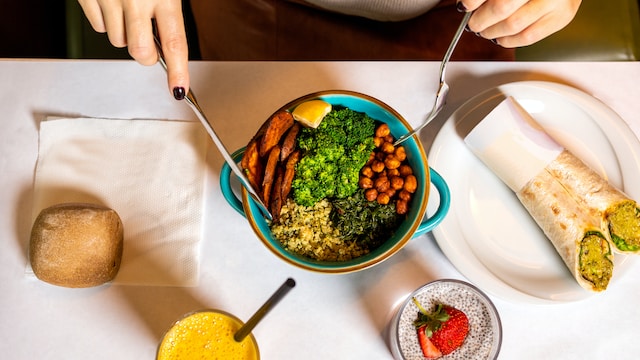
Plant-based sources of Vitamin D are limited as natural forms occur mainly in animal products such as fatty fish and egg yolks. However, there are many vegan-friendly sources available to vegans, which include mushrooms exposed to UV light and certain types of algae grown outdoors.
Additionally, fortified vegan foods such as soy milk, orange juice, oatmeal, and breakfast cereals often contain added Vitamin D to make up for what may not be consumed through other foods. With a few simple changes in diet and nutrition choices, vegans can incorporate more Vitamin D into their lives while still maintaining their plant-based lifestyle.
When considering the importance of Vitamin D for optimal health, it’s essential for vegans to seek out alternative ways to gain access to this vital nutrient, either through dietary supplementation or increased sun exposure when possible.
As we transition now into discussing the potential implications of Vitamin D deficiency in vegans, it’s important to remember that proper nutrition plays an integral role in overall well-being irrespective of dietary preferences.
Vitamin D Deficiency In Vegans
As we’ve discussed, vegan sources of vitamin D are essential for a healthy plant-based lifestyle. Unfortunately, vegans can be at risk for developing vitamin D deficiency due to the lack of natural dietary sources. It’s essential that vegans consume enough calcium and other vitamins from fortified foods or supplements in order to avoid this issue.
Vitamin D is an integral part of maintaining bone health and it’s especially important when combined with calcium intake since the two work together to promote optimal bone health. Vitamin D helps your body absorb calcium more efficiently so any diet lacking in both puts you at greater risk for poor bone health. For example, if you’re not getting enough vitamin D3 then you may find it challenging to get enough calcium even through plant-based sources such as tofu and kale.
The good news is there are plenty of vegan-friendly options available which provide ample amounts of both vitamin D and calcium. Examples include fortified non-dairy milk, cereals, juices, spreads like margarine and nut butter supplemented with extra vitamin D3, as well as mushrooms exposed to ultraviolet light (a form of natural photosynthesis).
These nutritious additions to your diet will help ensure that you’re meeting your daily needs for these vital nutrients without having to rely on animal products.
With all these delicious alternatives available, it’s now easier than ever to make sure you have adequate levels of both vitamins despite following a vegan diet. Moving forward, let’s explore what specific plant-based foods offer valuable amounts of vitamin D and how much should be consumed each day for optimum absorption rates into the body.
Vitamin D Content In Plant-Based Foods
Vitamin D, sometimes referred to as the ‘sunshine vitamin’, is an essential nutrient that plays a key role in strengthening our bones and maintaining healthy muscles.
Vegans are often concerned about getting adequate amounts of this important nutrient since many familiar sources come from animal products. Fortunately, there are plenty of vegan sources of Vitamin D available.
Although it’s possible for vegans to get enough Vitamin D through sun exposure alone, some plant-based foods provide excellent sources of this vital micronutrient.
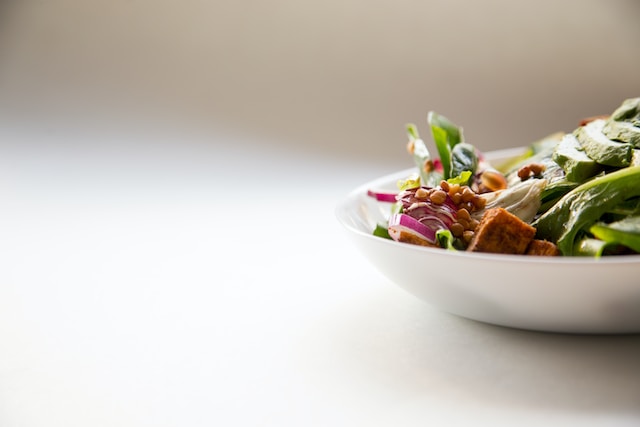
Foods like fortified plant milks, mushrooms (especially when exposed to UV light), and certain breakfast cereals contain significant amounts of Vitamin D. Eating a variety of these foods can be beneficial for those following a vegan lifestyle and looking to increase their intake of the sunshine vitamin.
In addition to incorporating more vegan Vitamin D sources into your diet, it’s also recommended that all adults should aim to consume between 10mcg-20mcg per day depending on age and health status.
Taking supplements may be necessary if you’re unable to meet daily requirements through dietary alone; however, always consult with your doctor before taking any new supplement regimen.
With the right combination of food choices and supplementation, vegans can easily ensure they have sufficient levels of Vitamin D in their bodies without compromising their plant-based lifestyle.
Transitioning now into the next section, we’ll explore natural sources of Vitamin D for vegans.
Natural Sources Of Vitamin D For Vegans
Fruits can be a great source of vitamin D for vegans, with oranges and grapefruits both having some naturally-occurring vitamin D.
Nuts and seeds, like almonds and sunflower seeds, are also options for vegans looking for a vitamin D boost.
Grains, such as oats and quinoa, can be an excellent source for vegans, and some mushrooms, like shiitake, can be a great way to get some vitamin D in a vegan diet.
Lastly, fortified foods and supplements can be a great way to ensure vegans get enough vitamin D.
Fruits
It’s no surprise that a vegan diet can get enough vitamin D while still adhering to their lifestyle – there are plenty of natural sources of vitamin D for vegans!
Fruits, in particular, are nutrient-rich and supply the necessary vitamins and minerals needed by those on plant-based diets. Notable fruits high in vitamin D include oranges, tangerines, lemons, grapefruit and limes. These citrus fruits contain small amounts of Vitamin D2 as well as other essential nutrients such as calcium and magnesium.
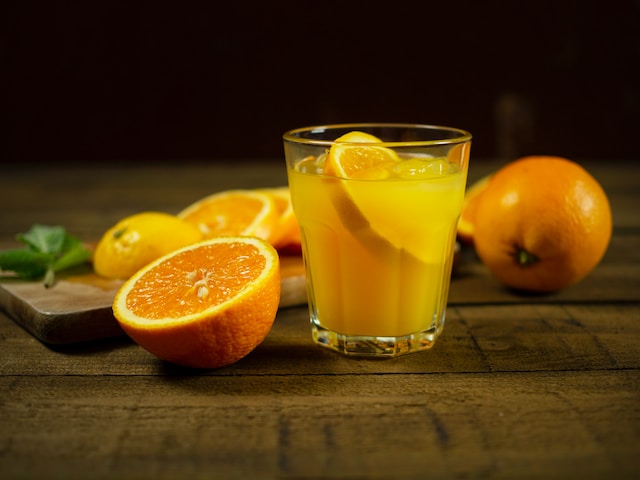
Even some tropical fruits like papaya have moderate levels of Vitamin D3. Eating these kinds of fruit regularly will provide important vitamins and minerals beyond just Vitamin D for a healthy vegan lifestyle.
Vitamin D supplements for vegans are another option available to make sure they’re getting adequate intake from non-animal sources. Many companies are offering specially formulated products with plant-derived ingredients approved for use in vegan diets. Most of these supplements contain certain mushrooms or algae extracts that are naturally rich in Vitamin D; however, it is always best to consult your medical professional before taking any dietary supplement.
In addition to food sources, sunlight and other forms of UV radiation also play an essential role in providing adequate Vitamin D for vegans following a plant-based lifestyle. Just 15 minutes spent outdoors can be beneficial without sunscreen, but wearing sun protection when spending extended periods outside is advised.
With proper planning and guidance, vegans should not have difficulty meeting their daily requirements for this essential nutrient.
Nuts
Nuts are an essential source of vitamin D for those on a vegan diet. They provide a great way to absorb the necessary nutrient without consuming any animal products, and they’re also packed with other essential vitamins and minerals that play a role in maintaining good health.
Almonds, cashews, walnuts, hazelnuts, pecans, Brazil nuts – all these varieties contain Vitamin D and other beneficial compounds like protein, fiber, iron, and magnesium. Eating them regularly will help vegans get enough of this vital vitamin while still adhering to their lifestyle.
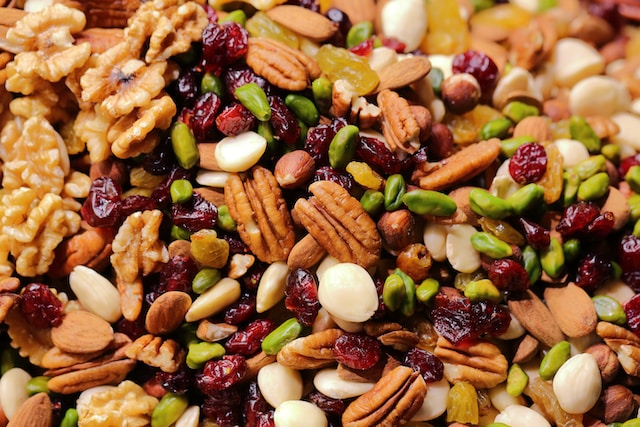
It’s important to note that the body needs some fat in order to properly absorb Vitamin D from plant sources such as nuts; hence why adding some nut butter or almond milk into one’s daily routine is encouraged. Studies suggest that supplementing with Vitamin D3 can further boost absorption rates – but always consult your doctor before taking supplements!
In conclusion, getting adequate amounts of vitamin D on a vegan diet is entirely possible through natural sources like fruits and nuts alone. Not only do they offer benefits beyond just supplying this essential nutrient, but eating them regularly helps ensure a proper absorption rate so vegans stay healthy and strong.
Vitamin D Supplements For Vegans
Let’s talk about vegan Vitamin D supplements and their benefits to vegans.
We know that Vitamin D is important for overall health and vegans may be deficient in this important nutrient.
Taking a supplement can help vegans meet their Vitamin D needs and can provide additional health benefits.
So, what are some of the benefits of taking Vitamin D supplements as a vegan?
Vegan Vitamin D Supplements
Living a vegan lifestyle can be hard to maintain, especially when it comes to getting all the essential vitamins and nutrients needed for optimal health. Vitamin D is an important nutrient that vegans need to make sure they’re getting enough of, as it helps with calcium absorption and other bodily functions.
Thankfully there are plenty of vegan sources of vitamin D available in supplement form. Vitamin D supplements come in either capsule or liquid form and can provide anywhere from 400-2,000 IU per serving.
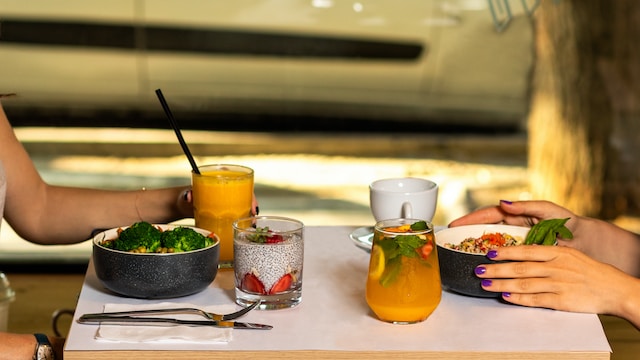
Liquid forms may contain flavoring agents such as peppermint oil or stevia leaf extract. Those who prefer capsules generally contain plant oils like sunflower seed oil or olive oil that act as a base for the active ingredient (vitamin D3).
Most brands also include additional ingredients like corn starch or cellulose to help keep the pills intact during digestion. The best way to get your daily dose of vitamin D while following a vegan diet is by taking an appropriate supplement every day – make sure you read labels carefully to know exactly what’s inside each product! That way, you can rest assured knowing you’re getting all the nutrition your body needs without compromising your values.
Benefits Of Vitamin D Supplements For Vegans
Taking a vitamin D supplement is one of the best ways for vegans to get their daily dose since it’s challenging to find vegan sources of this vital nutrient.
Not only will they be able to enjoy all the health benefits that come with taking in adequate amounts of vitamin D, but they can also do so without compromising their values.
Taking a supplement helps ensure that vegans are getting enough calcium and other essential vitamins and minerals needed for optimal health.
Furthermore, there are plenty of vegan-friendly options available on the market today, including both capsule and liquid forms.
While capsules usually contain plant oils as bases for active ingredients like vitamin D3, liquid supplements might include flavouring agents such as peppermint or stevia leaf extract.
No matter what form you choose, though, read labels carefully before deciding which product is right for you!
Vitamin D And Plant-Based Living
Vitamin D is an essential nutrient that plays a key role in maintaining strong bones and healthy immune systems. It can be found in both animal-based and plant-based foods, making it possible for vegans to get enough of the vitamin without consuming any animal products.
There are several vegan sources of vitamin D available today:
- Fortified dairy alternatives such as soy milk, almond milk, or coconut milk
- Mushrooms exposed to ultraviolet light during growth
- Vitamin D supplements derived from lichen
- Certain types of orange juice also contain vitamin D
It’s important for vegans to make sure they’re getting enough of this crucial nutrient in their diet. With so many options now available, it has become much easier for those on a plant-based diet to ensure they have adequate levels of vitamin D.
Moving forward, we will discuss another option – sunlight and vitamin d for vegans.
Sunlight And Vitamin D For Vegans
Vitamin D is a crucial nutrient for vegans, as it’s not found in many plant-based foods. Fortunately, sunlight and fortified vegan foods can provide vegans with the necessary vitamin D intake to maintain good health.
The best source of Vitamin D for vegans comes from spending time outdoors in natural sunlight. Sunlight helps your body produce its own Vitamin D naturally through photosynthesis – this is known as cholecalciferol or vitamin D3. Spending 10–15 minutes outside during peak daylight hours twice per week should enable you to obtain enough sun exposure for healthy levels of Vitamin D.

It’s important to note that sunscreen will limit your skin’s ability to absorb Vitamin D from the sun so if you use sunscreen, be sure to spend more time out in the sun than usual. Additionally, people who live at higher latitudes may need additional supplementation due to reduced sun intensity during winter months.
Vegan diets also have access to fortified foods, rich sources of dietary Vitamin D, such as some brands of almond milk, orange juice, soy milk, breakfast cereals, and margarine spreads made with fortification technology.
Check food labels carefully when shopping for these products because not all manufacturers add Vitamin D to their products. To get an adequate daily dose of Vitamin D while staying vegan simply look out for vegan-friendly fortified items on supermarket shelves and incorporate them into your diet regularly.
A combination of limited but regular sunlight exposure coupled with intelligent selection and consumption of fortified vegan items provides a solid foundation for meeting recommended daily allowances of this essential vitamin without compromising on one’s ethical values or lifestyle choices.
With careful planning and consideration, it is possible for any vegan individual to meet their nutritional needs and stay healthy! Moving forward, let’s explore other ways vegans can get their required amounts of Vitmain D – through fortified vegan foods specifically designed for this purpose…
Fortified Vegan Foods For Vitamin D
I’m sure many of us have heard that vitamin D is an important nutrient, but did you know that you can get it from vegan sources?
Let’s take a look at some of the fortified vegan foods that are great sources of vitamin D, such as fortified soy milk, fortified orange juice, and fortified breakfast cereals.
Soy milk is a great addition to any vegan diet as it is fortified with vitamin D, making it a great source of nutrient.
Orange juice is also fortified with vitamin D, making it a great addition to any meal.
Finally, there are also fortified breakfast cereals that are great sources of vitamin D.
With all these options, it’s easy to get the vitamin D you need from a vegan diet.
Fortified Soy Milk
When it comes to vegan sources of Vitamin D, fortified soy milk is a great option. It’s an excellent plant-based alternative to cow’s milk and contains many of the same essential nutrients—including calcium and vitamin D!
Many brands are now fortifying their products with additional amounts of this key nutrient, making it easier than ever for vegans to get the amount they need on a daily basis.

So if you’re looking for an easy way to increase your intake of Vitamin D without having to take supplements, then fortified soy milk is definitely worth considering. Plus, it tastes good too!
And since it can be added to cereals or smoothies, there are lots of creative ways to include it in your diet as part of a healthy plant-based lifestyle.
Fortified Orange Juice
Okay, now let’s talk about fortified orange juice.
As with soy milk, this is a great vegan option for getting your daily dose of Vitamin D. Most brands are already fortified and will provide you with the recommended amount—all without having to take any additional supplements.
And like soy milk, it also tastes delicious! Plus, its high vitamin C content makes it an even healthier choice.
So if you’re looking for another way to get your necessary nutrients while still following a plant-based diet, then adding some fortified orange juice into your meals is definitely worth considering. It can be used in smoothies or juices as well as being added straight up into cereals or oatmeal – so there’s plenty of ways to enjoy this tasty beverage.
Fortified Breakfast Cereals
So fortified orange juice is a great option for getting your daily Vitamin D intake in, but it’s not the only one. Fortified breakfast cereals are also an excellent choice.
Most brands will provide you with the recommended amount of Vitamin D and other necessary nutrients like iron and zinc – all without having to take any additional supplements. And since they come in so many different flavors, you’re sure to find something that fits your tastes!

Plus, some cereal boxes even include an extra bonus prize inside – just another incentive to make this vegan food part of your regular diet. But don’t forget about the classic way to get your morning dose of vitamins: oatmeal.
As long as you opt for a brand that offers fortification, then there’s no need to worry about missing out on anything important—it’ll give you everything you need right away. You can top it off with some fruit or nuts for added flavor and crunch, plus maybe add some fortified milk if desired.
Either way, it’ll be sure to keep you full until lunchtime rolls around! So whether its orange juice, cereal or oatmeal, there’s plenty of vegan options out there when it comes to getting enough Vitamins D and other essential nutrients while sticking with plant-based eating habits.
So go ahead and give them a try—you won’t regret it!
Benefits Of Vitamin D For Vegans
Vitamin D is an essential nutrient for vegans, as it helps to protect bone health, skin health, and cognitive function.
It’s important to make sure vegans get enough of it, as their diets may not provide enough. Fortunately, there are plenty of vegan sources of vitamin D, such as fortified plant milks and cereals, mushrooms, and sun exposure.
Eating these sources regularly can help vegans build and maintain strong bones, promote healthy skin, and enhance cognitive function.
It’s also important to note that vitamin D is a fat-soluble vitamin, so vegans should make sure to consume enough healthy fats for it to be properly absorbed.
Bone Health
Vitamin D is essential for bone health, and vegans need to ensure they are getting an adequate amount.
Vitamin D helps facilitate the absorption of calcium in the body, making it a key nutrient for those who follow plant-based diets.
Fortunately, there are several vegan sources of vitamin D available that can help ensure optimal intake levels.
These include fortified orange juice, cereal, non-dairy milk, and mushrooms exposed to ultraviolet light.
Additionally, supplements may be used as well if needed.
With careful selection and regular intake of these foods or supplements, vegans can enjoy strong bones while still maintaining their dietary preferences.
Skin Health
Skin health is another important benefit of vitamin D for vegans. It is really important for a healthy skin glow.
Vitamin D helps to regulate the immune system, which can protect against skin conditions like eczema and psoriasis.
It also helps maintain skin’s elasticity and reduces wrinkles, giving it a more youthful appearance.
Studies have shown that taking supplemental vitamin D may even help reduce acne breakouts.
So not only does regular intake of vegan sources of vitamin D keep bones strong, but it can also keep skin healthy and looking its best too!
Cognitive Function
With all the physical benefits of vitamin D for vegans, it also has some mental advantages too.
Studies show that taking supplemental vitamin D can help improve cognitive function, particularly in older adults.
This means that vegans who are getting enough vitamin D may be better able to focus and remember things than those who don’t get enough of this nutrient.
It’s thought that higher levels of vitamin D may even help protect against age-related decline in brain functioning.
Therefore, regular intake of vegan sources of vitamin D could not only keep bones strong but also support healthy cognition as well.
Vitamin D And Plant-Based Lifestyle
Vitamin D is an essential nutrient for vegans and plant-based eaters alike. It helps the body absorb calcium, which supports healthy bones and muscles.
But how can vegans get their daily dose of Vitamin D? Fortunately, there are a variety of vegan sources that you can incorporate into your routine to meet your nutritional needs.
Many foods such as mushrooms, fortified soy milk, cereals, orange juice, tofu, almond butter and margarine are all good sources of Vitamin D. Additionally, some brands offer supplements specifically formulated with vitamin D derived from lichen or algae – perfect for those following a plant-based lifestyle.
Making small dietary changes can make a big difference in overall health when it comes to this important vitamin. Eating regular meals containing these vegan sources of Vitamin D will help ensure you’re getting enough throughout the day without compromising on taste or nutrition values.
With careful planning and mindful choices, vegans can easily reach their recommended levels of Vitamin D intake while still enjoying delicious food!
Conclusion
Overall, having a plant-based lifestyle can be healthy and rewarding when the right nutrients are consumed.
For vegans, vitamin D is an important nutrient that can be hard to come by without animal products.
However, with careful planning and implementation of natural sources like sunlight, fortified vegan foods, and supplements if necessary, one can have plenty of this essential vitamin in their diet.
With all these options available to us, it’s easier than ever for vegans to get enough vitamin D while still maintaining a nourishing plant-based lifestyle.
Frequently Asked Questions
Do vegans have vitamin D deficiency?
Vegans can be at a higher risk of vitamin D deficiency if they do not consume vitamin D-fortified foods or take supplements.
Can you get vitamin D from plants?
Vitamin D is primarily found in animal-based sources, but certain types of mushrooms and some fortified plant-based foods and supplements can provide vitamin D.
How can I get vitamin D if I am dairy free?
Vitamin D can be found in fortified dairy-free milk alternatives, such as soy, almond, and oat milk, as well as in fortified orange juice and supplements.
Where do vegans get vitamin D3?
Vegans can get vitamin D3 from certain types of mushrooms or from supplements derived from lichen.
Why do vegans avoid vitamin D3?
Vegans may avoid vitamin D3 because it is often derived from animal sources, such as sheep’s wool, and therefore may not align with their ethical or dietary choices.
Do vegans lack D3?
Vegans can lack D3 if they do not consume vitamin D-fortified foods or supplements, but it is not unique to the vegan diet.
Is tofu high in vitamin D?
Tofu is not a significant source of vitamin D, but some brands may be fortified with the vitamin.
What vegetable is high in vitamin D?
Mushrooms are the only significant vegetable source of vitamin D. However, some varieties of mushrooms, such as shiitake and portobello, have higher levels of vitamin D than others.
What fruit is highest in vitamin D?
Fruits are not typically high in vitamin D, but some fortified fruit juices and cereals may contain added vitamin D.
Is almond milk good for vitamin D?
Almond milk can be a good source of vitamin D if it is fortified with the vitamin.
What are the signs you need vitamin D?
Signs of vitamin D deficiency include fatigue, bone pain, muscle weakness, depression, and impaired wound healing. However, these symptoms can also be caused by other factors, so a blood test is needed for an accurate diagnosis.
How can I increase my vitamin D levels quickly?
The fastest way to increase vitamin D levels is through direct sunlight exposure, but it is important to limit exposure to prevent skin damage. Vitamin D supplements and fortified foods can also increase levels over time.
Do oats have vitamin D?
Oats do not naturally contain vitamin D, but some brands of oatmeal may be fortified with the vitamin.
How long do you need to be in the sun for vitamin D?
The amount of time needed to produce enough vitamin D varies based on factors such as skin tone, geographic location, and time of day. However, it is generally recommended to get 5-30 minutes of midday sunlight exposure twice a week without sunscreen, depending on skin type and UV index.
References
- The Vegetarian Society. (2021). Vitamin D. https://www.vegsoc.org/info-hub/health-and-nutrition/vitamin-d/
- The Vegan Society. (2021). Vitamin D. https://www.vegansociety.com/resources/nutrition-and-health/nutrients/vitamin-d
- Mayo Clinic. (2021). Vitamin D. https://www.mayoclinic.org/drugs-supplements-vitamin-d/art-20363792